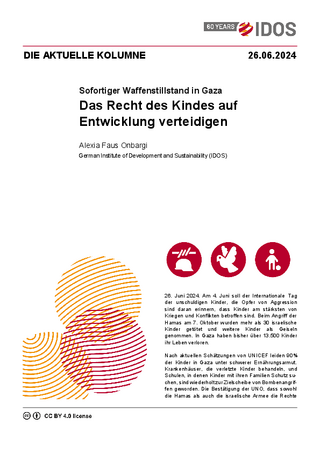
Ceasefire in Gaza now
In defense of children’s right to development
Faus Onbargi, AlexiaThe Current Column (2024)
Bonn: German Institute of Development and Sustainability (IDOS), The Current Column of 26 June 2024
26 June 2024. The International Day of Innocent Children Victims of Aggression, commemorated on 4 June, reminds us that children are the most affected by war and conflict. When Hamas launched its attack on 7 October, more than thirty Israeli children were killed and more were taken hostage. In Gaza, over 13,500 children have lost their lives so far.
UNICEF has recently estimated that 90% of Gazan children are experiencing severe food poverty. Hospitals treating injured children and schools sheltering children and their families have been repeatedly targeted and bombed, and many are not even functional. The UN’s confirmation that both Hamas and the Israeli army are violating children’s rights in armed conflict – and that these violations are happening in Palestine and Israel more than anywhere else in the world - should prompt Germany, the US and other advocates of human rights and sustainable development to urgently take action.
The Israeli government, in justifying its offensive in Gaza, has argued that Hamas fighters hide within the civilian population. This claim has proven to be true on numerous occasions, which is horrifying and condemnable. At the same time, the principles of international humanitarian law clearly state that non-combatants cannot be targeted, and that it is forbidden to employ weapons that inflict excessive injuries and unnecessary suffering. Israel, like many other countries, has signed and ratified the UN Convention on the Rights of the Child, which emphasises children’s right to life and governments’ responsibility to ensure children’s survival and development to the maximum extent possible.
The Israeli government has not been delivering on this responsibility given the humanitarian disaster in Gaza, which has not only shattered the lives of thousands of Palestinians today, but greatly threatens those of future generations. Conflict has a massive effect on children’s health, development and well-being, as SDG 16 on ‘Peace, justice and strong institutions’ emphasises. The Israeli children that witnessed Hamas’ atrocities, and those that were taken hostage, will require intensive psychological support to overcome the trauma of their ordeal. In Gaza, aside from also experiencing trauma and grief, an entire generation of Palestinian children are at risk of growing up malnourished and with infectious illness, with lack of access to adequate health, sanitation and water services.
Continuous bombardment also pollutes the water these children drink, the air they breathe, and the soil that grows any food they may eat in the future. Vulnerable Gazan children, such as those with physical or intellectual disabilities that require continuous or expensive medical care, are especially at risk. Conflict also sets back educational progress and increases the likelihood of forced child labour, child poverty, child marriage, and sexual violence. Victims here are usually girls.
Recently, the US State Department acknowledged that Israel is ‘likely’ breaching international law, while the German Vice Chancellor, Robert Habeck, has noted that ‘the suffering of the Palestinian population, the attacks in the Gaza Strip are (…) incompatible with international law’. This reality is also incompatible with the responsibility of state parties to the UN Convention on the Rights of the Child of ensuring children’s survival and development. It is unclear how sustainable development, i.e. “meeting present needs without compromising the chances of future generations to meet their needs”, can happen under constant shelling in Gaza, where human development has already been setback by two decades. Stunted development in Gaza is a problem for Israel, too. From the rubble of this war, a whole generation of Palestinians is at risk of growing up with extremist views, of being enticed by the same ideologies that underpin terrorist groups like Hamas. This risks Israel’s long-term security and threatens future Israeli generations’ right to live free from violence, as well as their own sustainable development.
The approach of Germany, the US and others has been to strongly support the Israeli government, both politically and militarily, while at the same time dedicating millions of euros of humanitarian assistance and aid to the Palestinian territories (Germany’s overall contribution has been of 294 million euros). However, such assistance is not enough to ensure children’s right to development in the long-term. As advocates of sustainable development and human rights, these countries must do much more, and call for an immediate and permanent ceasefire.
Defending children’s right to development for its own sake should be a top priority. Germany, the US and others have been losing international legitimacy and credibility due to their strong support for Israel’s government despite the latter’s breach of international humanitarian law. Their reputation as global promoters of sustainable development and human rights should not now also be at risk. This starts by putting children’s right to development – which requires peace and freedom from conflict - at the heart of their efforts both in Israel and in Palestine.

